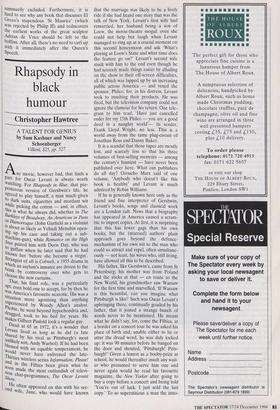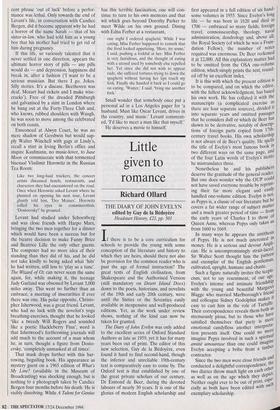Rhapsody in black humour
Christopher Hawtree
A TALENT FOR GENIUS by Sam Kashner and Nancy Schoenberger Villard, $25, pp. 527 Any movie, however bad, that finds a Part for Oscar Levant is always worth watching. For Rhapsody in Blue, that pre- posterous version of Gershwin's life, he agreed to play himself, a man much given to dark suits, cigarettes and mordant wit While picking the cotton — and, in effect, this is what he always did, whether in The Barkleys of Broadway, An American in Paris or Humoresque (John Garfield as a violinist is about as likely as Yehudi Menuhin open- ing up his case and taking out a sub- Machine-gun), while Romance on the High Seas paired him with Doris Day, who was IL. guffaw when he later said that he had "9wn her 'before she became a virgin'. Strangest of all is Cobweb, a 1955 drama in W, IIieb an asylum's inmates are driven to the brink by controversy over who gets to choose the new curtains. That, his final role, was a particularly apt, even bold one to accept, for by then he Was America's favourite neurotic. His was a situation more agonising than anything experienced by Woody Allen's analyst. Phobic, he went beyond hypochondria and, drugged, took to his bed for years. He makes Gilbert Pinfold look a regular guy. Dead at 65 in 1972, it's a wonder that Levant lived as long as he did (a fate shared by his rival as Pittsburgh's most unlikely son, Andy Warhol). If he had been blessed with an equable temperament, he Would never have enlivened the late- Thirties wireless series Information, Please! and in the Fifties been given what he s9911 made the most outlandish of televi- sion chat-programmes The Oscar Levant Show, , He often appeared on this with his sec- ond wife, June, who would have known that the marriage was likely to be a lively ride if she had heard one story that was the talk of New York. Levant's first wife had remarried, her husband being a son of Loew, the movie-theatre mogul: even she could not help but laugh when Levant managed to ring up at a crucial moment on this second honeymoon and ask 'What's playing at Loew's State and what time does the feature go on?' Levant's second wife stuck with him to the end even though he had scarcely made things easier by alluding on the show to their off-screen difficulties, all of which was lapped up by an increasing public across America — and vexed the sponsor, Philco, for, in his distress, Levant took to insulting their products. He was fired, but the television company could not ignore the clamour for his return. One tele- gram to him read, 'Have just cancelled order for my 15th Philco — you are a good deed in a naughty world'— its sender, Frank Lloyd Wright, no less. This is a world away from the tame plug-circuit of Jonathan Ross and Danny Baker.
It is a scandal that those tapes are mostly lost, and scarcely less so that his three volumes of best-selling memoirs — among the century's funniest — have never been published over here. What can publishers do all day? Groucho Marx said of one volume, 'Anybody who doesn't like this book is healthy' and Levant is much admired by Robin Williams.
If he is generally known here only as the friend and fine interpreter of Gershwin, Levant's books, songs and classical work are a London cult. News that a biography has appeared in America caused a scram- ble to import copies. At first, it is surprising that this has fewer gags than his own books, but the (married) authors' plain approach goes beyond the defence- mechanism of his own wit to the man who could so attract and repel, often simultane- ously — not least, his wives who, still living, have allowed all this to be described.
His father, like Gershwin's, came from St Petersburg; his mother was from Poland and the sticks at that — en route to the New World, his grandmother saw Warsaw for the first time and marvelled, 'If Warsaw is this beautiful, can you imagine what Pittsburgh is like!' Such was Oscar Levant's upbringing there, continually goaded by his father, that it joined a strange bunch of words never to be mentioned. He meant what he didn't say, for, come the Fifties, at a border on a concert tour he was asked his place of birth and, unable either to lie or utter the dread word, he was duly locked up: it was 90 minutes before he banged on the door and shouted, 'Pittsburgh! Pitts- burgh!' Given a lemon as a booby-prize at school, he would thereafter insult any wait- er who presumed to serve him one and never again would he read his favourite magazine, the New Yorker after going to buy a copy before a concert and being told `You're out of luck. I just sold the last copy.' To so superstitious a man the inno-
cent phrase 'out of luck' before a perfor- mance was lethal. Only towards the end of Levant's life, in conversation with Candice Bergen, did it become apparent why he had a horror of the name Sarah — that of his sister-in-law, who had told him as a young boy that his mother had tried to get rid of him during pregnancy.
If this life, so variously talented that it never settled in one direction, appears the ultimate horror story of pills — any pills would do — and depression, happiness did break in, after a fashion CI want to be a serious musician. But there I go. Jokes. Silly stories. It's a disease. Beethoven was deaf, Mozart had rickets and I make wise- cracks'). Free of the dreaded Pittsburgh and galvanised by a stint in London where he hung out at the Forty-Three Club and, who knows, rubbed shoulders with Waugh, he was soon to move among the celebrated on both coasts.
Ensconced at Alwyn Court, he was no mere shadow of Gershwin but would sup- ply Walter Winchell with gags at Lindy's, recall a stint in Irving Berlin's office and inspire Kaufmann, no music-lover, to June Moon or commiserate with that tormented bisexual Vladimir Horowitz in the Russian Tea Room:
Like two long-haul truckers, the concert artists discussed hotels, restaurants, and characters they had encountered on the road. Once when Horowitz asked Levant where he planned on opening his next tour, Levant glumly told him, 'Des Moines'. Horowitz rolled his eyes in commiseration. `Dostoevsky!' he groaned.
Levant had studied under Schoenberg and was close friends with Harpo Marx, bringing the two men together for a dinner which would have been a success but for the bizarre decision to make Fanny Brice and Beatrice Lille the only other guests. The composer had no more idea of their standing than they did of his, and he did not take kindly to being asked what 'hits' he had written, still less to 'play us a tune'. The Wizard of Oz can never seem the same again, for, while making it, the teenage Judy Garland was obsessed by Levant 3,000 miles away. This went no further than an embrace, a meeting of insecurities if ever there was one. His polar opposite, Christo- pher Isherwood, was a great friend. Levant, who had no luck with the novelist's yoga breathing-exercises, thought that he looked `like a tweedy Will Rogers and sounded like a poetic Huckleberry Finn'; word is that Isherwood's forthcoming journals will add much to the account of a man whom he, in turn, thought a figure from Dosto- evsky, 'completely unmasked at all times'.
That mask drops further with this har- rowing, beguiling book. His appearance as mystery guest on a 1965 edition of What's My Line? (available in the Museum of Broadcasting) was shocking enough, but is nothing to a photograph taken by Candice Bergen four months before his death. He is visibly dissolving. While A Talent for Genius has this terrible fascination, one will con- tinue to turn to his own memoirs and that wit which goes beyond Dorothy Parker to meet Wilde on his own ground. Dining with Edna Ferber at a restaurant,
one night I ordered spaghetti. While I was eating, Miss Ferber happened to remark that the food looked appetizing. 'Here, try some,' I said, pushing a forkful at her. Miss Ferber is very fastidious, and the thought of eating with a utensil used by somebody else repelled her. Yet since she did not wish to appear rude, she suffered tortures trying to down the spaghetti without having her lips touch my fork. Finally she handed it back so I could go on eating. 'Waiter,' I said, 'bring me another fork.'
Small wonder that somebody once put a personal ad in a Los Angeles paper for 'a husband. Must like Oscar Levant, drives in the country, and music.' Levant comment- ed, 'I'd like to meet a man like that myself.'
He deserves a movie to himself.











































































































 Previous page
Previous page